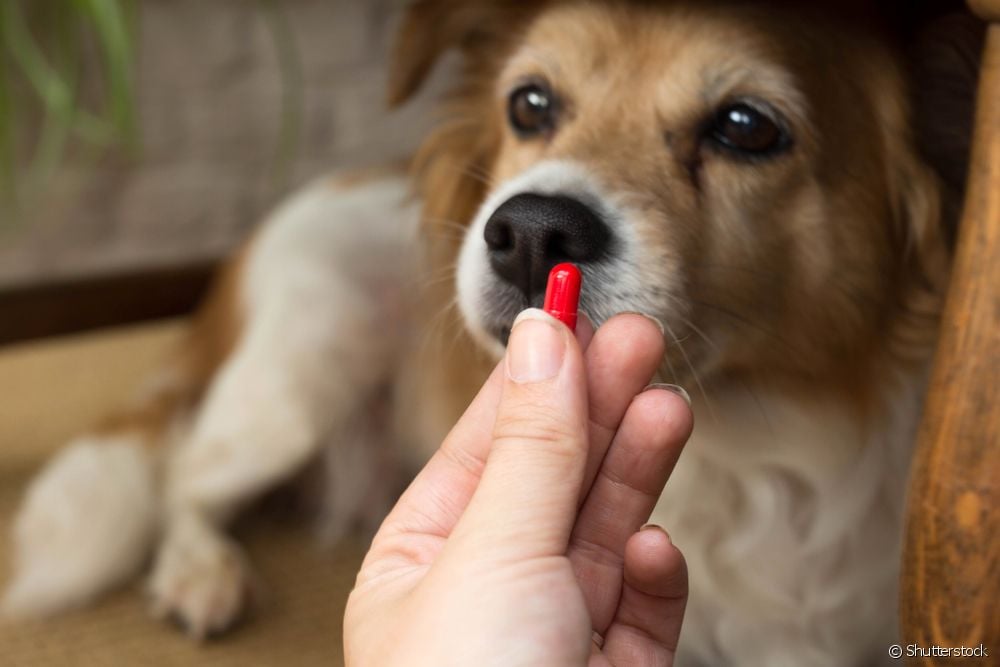Urinary infection in dogs: what are the causes, signs, complications and how to treat the problem?

Table of contents
Urinary tract infection in dogs is a more frequent condition than one might think when we talk about dog health. Also known as urinary tract infection (UTI), the disease is usually caused by bacteria, but it can also happen due to the presence of fungi and viruses in the animal's body. To understand a little more about urinary infection in dogs (treatment, causes and symptoms of the disease),o Patas da Casa talked to veterinarian Natalia Seoane, who is from the VET Popular hospital. See what she told us about this problem below!
What is urinary tract infection in dogs anyway?
Although it is often confused with cystitis due to the symptoms, which are similar, it is important to keep in mind that urinary tract infection in dogs is a totally different condition and therefore has different causes and treatments. "Urinary tract infection (UTI) occurs due to improper management or procedure in the urinary system, through diseases that manifest at the same time,colonization and multiplication of bacteria in the mucosa of the urinary tract and also due to the predisposition of some primary diseases, such as diabetes mellitus and chronic kidney disease ", explains the veterinarian. Therefore, it is important to identify the type of infection before starting any type of treatment, since the cause and severity of the condition are variable.
Urinary infection in dogs: the causes behind the problem
As the veterinarian points out, the causes of urinary infection in dogs can be diverse. Sometimes, a simple drug reaction can be the cause of the problem. In other cases, low immunity or some change in the composition of the urine may be behind the infection. In addition, factors such as obesity, presence of urinary calculi, polyps or neoplasms may also be associated with the infection.An unbalanced diet, sedentary lifestyle, low water intake and even the natural aging of the dog are also possible causes of this disease.

Urine infection: dog can show different symptoms
Just as the causes can vary, cases of urinary tract infection in dogs can also have different symptoms. According to Natalia, dogs can be asymptomatic and not manifest any symptoms, or symptomatic, showing one or more signs that they have this health problem. To identify if the dog is sick, the guardian can check the following symptoms:
- Increased frequency of urination in small volumes
- Difficulty in urinating
- Urinary incontinence
- Peeing in unusual places
- Bloody, cloudy or smelly urine
- Excessive thirst
- Loss of appetite
See_also: Male dog name: 200 options to call large and giant sized dogs- Prostration
- Fever
Dog: urinary infection should be diagnosed by a professional
If you suspect that your dog has a urinary tract infection, you should immediately take your dog to the veterinarian for a series of tests to confirm the diagnosis of the disease. "The professional will perform a good physical examination and will order blood, urine, culture and antibiogram tests; in addition to imaging tests such as abdominal ultrasound and abdominal radiography.when urinary calculi are suspected, for example," Natalia explains.
Urinary infection in dogs: treatment can be done with drugs or surgery
With the confirmation of the condition by the veterinarian, it is time to start the treatment of your four-legged friend. To take care of the urinary infection in dogs, medication can be an alternative, as long as it is prescribed by the doctor. If the cause of the disease is bacterial, for example, the antibiotic for urinary infection in dogs is recommended. In addition, other remedies that can be part of the treatment areIf the remedy for urinary tract infection in dogs does not work, and the cause of the problem is more severe, the veterinarian says that surgical interventions may also be indicated.
For treatment to be even more effective and with shorter recovery time, the ideal is that the urinary infection in dogs is discovered early on. "Not treating or treating inadequately will bring serious complications mainly kidney infections, sepsis, kidney abscesses, loss of kidney function, bacterial resistance and death of the pet", warns Natalia.
Urinary infection in dogs: can home treatment help?
Many people turn to the internet when trying to help their four-legged friend, but this is not ideal. Remember that even if you want to treat your dog with urinary infection with natural alternatives, it is always important to have the accompaniment of a veterinarian in the case. As Natalia points out, homemade diets can even help the animal, but, before being implemented, it isit is necessary to undergo an evaluation with a veterinary nutritionist, who is a specialist in animal nutrition. As the professional is trained for this, he must prescribe a balanced diet according to the needs of each patient.
Prevention of urinary infection in dogs requires some care
Do you want to prevent your friend from having this kind of problem? The veterinarian says that it is entirely possible to avoid urinary infection in dogs with some measures. "The puppy must always have access to clean and fresh water to drink and urinate frequently, in addition to a balanced diet. Beware of snacks, foods high in sodium and of poor quality ", he advises. In addition, it is worth mentioning thatit is always essential to seek the help of a professional and never self-medicate your pet (especially antibiotics), as this can end up triggering a series of health problems in the animal.

